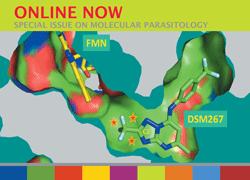issue contents
June 2018 issue

Cover illustration: The three-dimensional structure of Escherichia coli purine nucleoside phosphorylase in complex with the noncompetitive inhibitor 7-deazahypoxanthine (Timofeev et al., p. 355). The orientation of the 7-deazahypoxanthine molecule was found to be rotated by 180° relative to bases found in other purine nucleoside phosphorylase structures.
research communications
 access
access

 journal menu
journal menu




















![[publBio]](/logos/publbio.gif)





